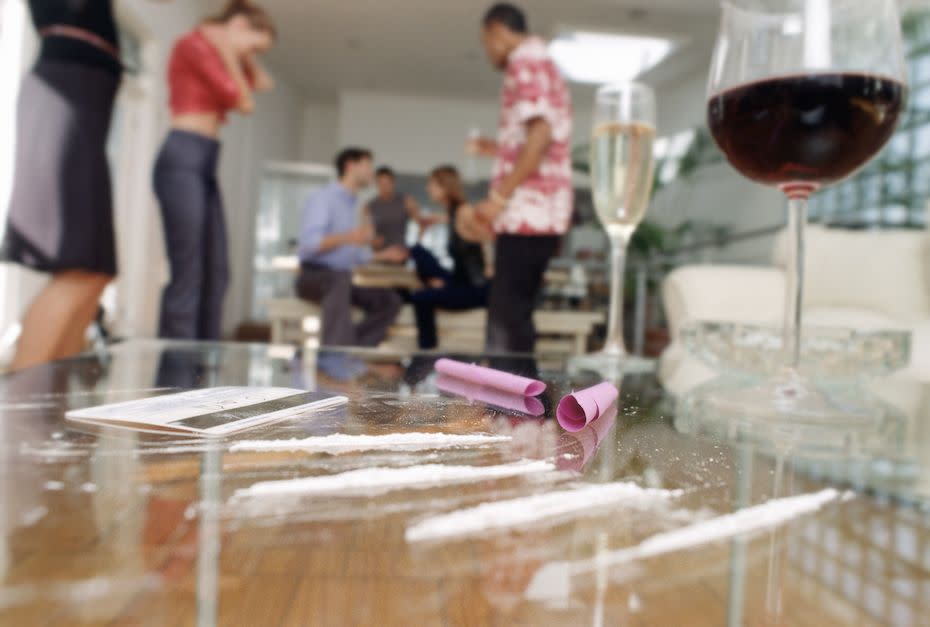What is monkey dust? The dangerous new street drug that has experts worried...

A dangerous drug that is relatively new to UK streets – and sells for as little as £2 – is concerning experts. Many people won't have heard of monkey dust, but use of the drug is on the rise and social media is littered with videos of users, some of whom have climbed buildings or tried to eat glass as a result of taking it.
But what is monkey dust? What are the risks of taking monkey dust? And is it illegal? We spoke to addiction specialist and psychiatrist Dr Catherine Carney, from Delamere rehabilitation clinic, to find out more about monkey dust.
What is monkey dust?
Monkey dust is the street name for methylenedioxy-α-pyrrolidinohexiophenone (or MDPHP) which is a synthetic cathinone. According to Talk to Frank, the chemical cathinone is a naturally occurring stimulant drug found in the plant, khat.
"Cathinones were originally sold over the internet as 'legal' alternatives to drugs like speed, ecstasy and cocaine," the Talk to Frank website explains. "To avoid trouble with the police, sellers marked the cathinones they were selling as 'not for human consumption', and sold them as plant food or bath salts."
Most cathinones are found as either a fine white, off-white or yellowish powder, but some can be brown in colour. Cathinones – like monkey dust – are usually snorted or wrapped in paper and swallowed. They can also be found as capsules or pills and can be smoked.
What are the physical risks of taking monkey dust?
Although cathinones – like monkey dust – can induce feelings of euphoria as well as increasing alertness and talkativeness, there are a lot of risks, too.
"Monkey dust can carry a number of serious physical risks to our body that can cause short and long-term damage," says Dr Carney.
These can include, but are not limited to:
Cardiovascular issues, such as an increased heart rate, higher blood pressure and angina (chest pain caused by reduced blood flow to the heart muscles). All of which can lead to heart attacks, strokes or other long-term health problems
Breathing problems, including chest pain or shortness of breath
Kidney damage, which in some cases may lead to kidney failure, if enough of the substance is consumed
Gastric distress, including nausea, vomiting or abdominal pain
"While these are just some of the physical risks that come with using monkey dust, it is important to note that the severity of these can vary hugely depending on a number of factors," adds Dr Carney. "These include the health of the user, how the substance is taken and what dosage is used."
What are the mental health risks of taking monkey dust?
"As well as physical risks, consuming monkey dust can carry extreme mental risks, which can last long after the drug has worn off," Dr Carney explains.
These again can include, but are not limited to:
Feelings of anxiety and depression, that may persist even once the effects of the drug have worn off
Problems with the cognitive function of the brain, including memory loss and poor decision-making or lack of control
Suicidal behaviours and thoughts
Psychotic behaviours including hallucinations and paranoia
"When it comes to monkey dust, the mental risks associated with the substance can be extremely severe," Dr Carney emphasises. "This is because, when consumed, it can produce a very pronounced euphoric high that interferes with the brain's natural system that regulates motivation and our emotions. When this happens, it can cause the user to act aggressively and violently, or causes them to have no control over their behaviour. This is why we have seen cases of people acting erratically in recent months."
What's more, because many cathinones are still new and little is known about them, the risks associated with them are unpredictable, the Talk to Frank website notes.

How easy is it to become addicted to drugs like monkey dust?
"Like with other stimulant drugs, when monkey dust is introduced into our body, the euphoria that it produces is so pronounced and intense that our brain lays down a memory of that feeling," says Dr Carney. "With repeated use of the substance a person's brain becomes so used to the pleasurable effects it brings, that it prioritises the drug over anything else, making it impossible to stop using it."
As well as this, "it is very easy to develop an addiction to monkey dust, because like alcohol, users can develop a tolerance to it the more they consume it."
"This means that eventually, they will need to take more and more of the substance in order to achieve the same pronounced high they did the first time they used it," the expert adds. "When consumption of monkey dust spirals out of control, users will eventually need the substance all the time in order to feel 'normal'."
If you are worried that you or a loved one is struggling with addiction to monkey dust, there are a few signs you can look out for, Dr Carney explains.
These include:
Increasing the amount of monkey dust consumed to achieve a euphoric high
Loss of interest in responsibilities or activities that were once enjoyable
Reduced performance or increased absence from education or work
Experiencing extreme withdrawal symptoms when not using the substance
Changing social circles to be with others who also use the drug
Increased feelings of depression and anxiety
Developing paranoia, hallucinations and/or psychosis, due to excessive use of the drug
Engaging in illegal, risky or dangerous activity, such as driving under the influence
Difficulty with relationships including family, friends and colleagues at work
"If someone you love is experiencing problems relating to the abuse of monkey dust, then it is important to act quickly and carefully, because use of the substance especially in high doses can be life-threatening," she adds.
Is monkey dust illegal?
Monkey dust is already banned in the US, and the government here is now pushing for the drug to be reclassified from Class B to Class A, like other controlled drugs including cocaine and ecstasy. In the UK, it is illegal to possess, supply and produce controlled drugs, and you can get a fine or face prison if you are found guilty.
If monkey dust is reclassified from a Class B to Class A drug, those caught supplying it would face a life sentence, while possession would carry a penalty of up to seven years in prison. Currently, as a Class B drug, those caught supplying monkey dust face a custodial sentence of 14 years, while those in possession of it could land five years in prison.
Not everyone is in agreement with the reclassification of monkey dust, however, with many taking to social media to argue that the focus should be on rehabilitation, not punishment. "If people use drugs to self medicate from trauma (which is mostly the reason that I come across), then the person needs support, and adding years to a prison sentence is unlikely to achieve this," one person tweeted, adding: "Lots of systemic issues to be addressed in the addiction field and the way people are treated. Trauma-informed thinking and practice is needed."
Someone else agreed with: "Same old!!! This will further drive substance use underground. Most people that use dust have complex needs. This action has the potential to exacerbate the stigmatisation and social isolation. Address the cause, not the problem."
For more advice on drugs, visit Talk to Frank where you can also reach out for help. For support with drug addiction, head to addiction.org.uk or the NHS' drug addiction support page.
This article is not intended to be a substitute for professional medical advice or diagnosis. Always seek the advice of your physician or other qualified health provider with any questions you may have regarding a medical condition.
You Might Also Like

